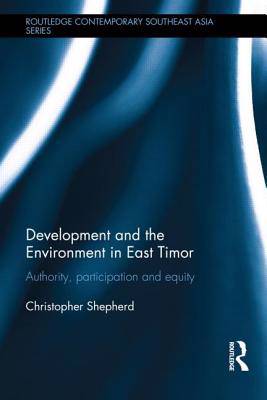
- Afhalen na 1 uur in een winkel met voorraad
- Gratis thuislevering in België
- Ruim aanbod met 7 miljoen producten
- Afhalen na 1 uur in een winkel met voorraad
- Gratis thuislevering in België
- Ruim aanbod met 7 miljoen producten
Development and Environmental Politics Unmasked
Authority, Participation and Equity in East Timor
Christopher ShepherdOmschrijving
Focusing on rural development and environmental management, this book brings together the detailed history of development in East Timor under two colonial regimes and under the contemporary conditions of national independence. It addresses two comparative areas of development: across the three political regimes and across four case studies of projects delivered by various national or international development agencies in independent East Timor.
Employing an original classificatory framework for kinds of approaches to development - coercive orders, mandated orders, negotiated orders - the book covers the plantation-centred development of Portuguese Timor as a European colony and the integration-oriented development of 'Timor Timur' as Indonesia's 27th province. It examines the neoliberal 'democratic' development of East Timor (or Timor-Leste) in the current context of state and nation-building, before drawing on case studies to investigate how development proceeds as a negotiation between authoritative state, non-state and international actors and local people who need to adapt development and conservation projects to suit their lived realities.
By using the history of East Timor to explore how particular modes of operationalising development interventions are intimately intertwined with the broader political system, this book makes a valuable contribution to the fields of Development Studies, Anthropology, Science and Technology Studies, and Southeast Asian Studies.
Specificaties
Betrokkenen
- Auteur(s):
- Uitgeverij:
Inhoud
- Aantal bladzijden:
- 296
- Taal:
- Engels
- Reeks:
Eigenschappen
- Productcode (EAN):
- 9780415842655
- Verschijningsdatum:
- 25/07/2013
- Uitvoering:
- Hardcover
- Formaat:
- Genaaid
- Afmetingen:
- 157 mm x 236 mm
- Gewicht:
- 576 g

Alleen bij Standaard Boekhandel
Beoordelingen
We publiceren alleen reviews die voldoen aan de voorwaarden voor reviews. Bekijk onze voorwaarden voor reviews.












